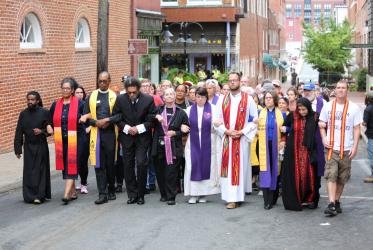Dr Pauline Webb, a British Methodist laywoman, multi-talented Christian communicator and ecumenical statesperson, died at the age of 89 on 27 April 2017 in Muswell Hill, London.
From the 4th Assembly of the World Council of Churches (WCC) at Uppsala in 1968 through the 5th Assembly at Nairobi in 1975, she was the first woman to serve as vice-moderator of the WCC’s governing bodies.
Webb was best-known in the English-speaking world as a communicator on radio and television. From 1979 until retirement in 1987, she was organizer of religious broadcasting for the BBC World Service. The author of many books and articles, and co-editor of the Dictionary of the Ecumenical Movement [1991, 2002], she produced an autobiography aptly titled World Wide Webb: Memoirs of Life in the Universal Church (2006).
Her wide-ranging interests are reflected in articles she assigned herself in the Dictionary of the Ecumenical Movement on the topics of communication, intercession, women in church and society, as well as biographical sketches of the WCC’s director of Faith and Order Lukas Vischer, and former WCC general secretaries Philip Potter and Konrad Raiser.
Webb considered Potter her ecumenical mentor, and on the occasion of his retirement she edited a Festschrift, or book of articles in his honour, entitled Faith and Faithfulness (WCC Publications, 1984).
A commissioned lay preacher, she spent her early career on the staff of the British Methodist Church Overseas Division with responsibilities in the Caribbean and Latin America. In 1965-66, she served as vice-president of the Methodist Conference.
Webb was WCC vice-moderator at the time of the first papal visit to Geneva, undertaken by Paul VI in June 1969. During his historic appearance in the Ecumenical Centre, the pope was welcomed by Webb, WCC moderator M.M. Thomas and general secretary Eugene Carson Blake.
Her skills as a communicator were put to the test in her courageous defense of the WCC Programme to Combat Racism (PCR), an outgrowth of the Uppsala Assembly. This programme became particularly controversial within and outside the churches for its opposition to apartheid in southern Africa.
Baldwin Sjollema, first director of the PCR, offered this response to the news of her passing: “Pauline has been for me a very special friend and also a comrade in arms in the WCC and its struggle against racism. Many battles in the WCC Central Committee, when she was the first female vice-moderator, and in the WCC’s Programme to Combat Racism, were ‘won’ because of her tough stance, her strong convictions and her faith in justice. She never lost hope in the most difficult situations and often helped me not to give up but to continue the battle.”
Rev. Dr Olav Fykse Tveit, the general secretary of the WCC, said: ”We owe a great debt of gratitude to Pauline Webb for her faithful service. We thank God for her gifts and especially for her unparalleled contribution to the World Council of Churches and to Christians everywhere. She was an agent of hope, not least for her championing of women in church and in society.”
High resolution photos available free of charge to illustrate this article.







